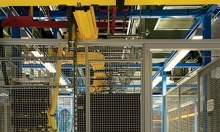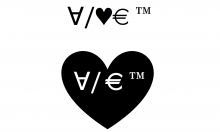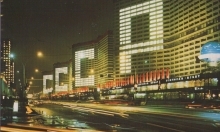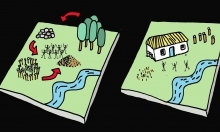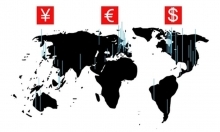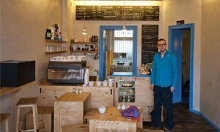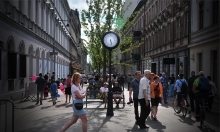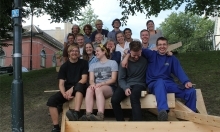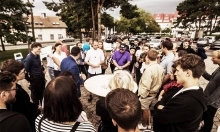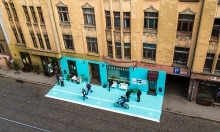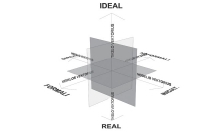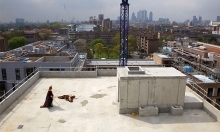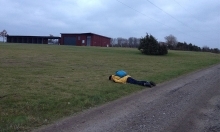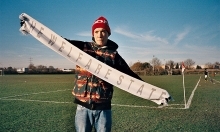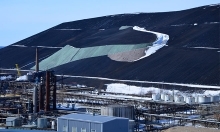MONEY
After waking up from the dreariness of the Soviet era and the dream of the 1990ies (according to the essay "The End of History?" by Francis Fukuyama, 1989), experiencing uncertainty after the recent (current) world economy crisis, we start perceiving an architect’s role in the contemporary world a little bit differently. The field of architecture has been increasingly affected by strong financial, ideological, political and cultural factors. With the diminishing authority of architects, representation of the public interest is being replaced by the "doing business" rankings, and all this determines architects’ working conditions, payment rates and copyright protection, as well as quality of their architectural production. Thus working under the global economy conditions and willing to make influence on urban development, an architect can no longer (and maybe has never been able to) ignore the logic of financial systems.
A pessimist would say that an architect from a public intellectual has been turned into an agent highly dependable on its clients, no longer able to be critical to environment and itself. Such “an invertebrate” has been delegated with the power to shape the environment – predictable, safe, but dull. On the other hand, can an architect, not driven by money or taking part in power games, also be successful at the same time? We are willing to believe that a contemporary architect is capable of integrating money into the discipline of architecture, rather than just giving shape to the fluid capital.
The 19th cycle of talks on architecture calls for an inconvenient discussion on the subject of money, during which experts in the fields of architecture, journalism, politics and social sector will look for a relationship between architecture, architect and money. We will try to answer the questions: what does money make to an architect, and what does an architect make with the money?
Curators: Vytautas Biekša, Kazys Varnelis, Matas Šiupšinskas.
Poster illustration by Ieva Mekšrūnaitė.
The 19th series of talks of Architecture Fund are sponsored by Lithuanian Council for Culture, Ministry of Culture of the Republic of Lithuania, Netherlands Embassy in Vilnius, Viljandi windows doors, Protectus.
The talks are held at the National Art Gallery (NDG), Konstitucijos av. 22, Vilnius, 8.00 p.m. The talks will be held in English and Lithuanian.
Entrance is free of charge. The events are recorded and the videos are placed online at www.archfondas.lt.
COLLABORATIVE PLACEMAKING
Today public space is the main social arena of our cities where civic life and our engagement with the over-all development of the city fabric is enacted and represented. In recent years there is wider recognition among researchers, politicians and communities of the profound importance these public spaces hold on urban life and social cohesion. Even though New Urban Agenda- HABITAT III preparation documents highlights the impotence of community participation in the global urban development, the main challenge still remains for most municipal governments, professionals and also communities. How to create, design or redesign and manage these public places in order to keep them inclusive, accessible and livable?
Placemaking approach is well capturing and addressing these challenges that already emerged in 1960 by Jane Jacobs and Wiliam H. groundbreaking idea designing cities for people. Today collaborative Placemaking is becoming an integral part of place governance discussions and most often used in practice as an interdisciplinary multi-faceted, hands-on approach to the planning, design and management of public spaces. Placemaking promotes not only better urban design, but it also creates space for collaboration, co-creation processes to emerge that contributes towards comprehensive governance of space and the city.
During the 18th session of ARCHITECTURE [discussion] fund talks we will invite the audience to have a look at Placemaking processes and examine how the creation of healthy public space brings together different stakeholders to collaborate. Rather that focusing on the physical properties of space creation, these talks and discussions are invited to scrutinize public place uses and functions they hold in the lives of the citizens and overall urban development of the city.
These public talks are dedicated to architectural community as well as wider publics. These series of events invites for the discussion about the architects’ professional and ethical responsibilities and the potential of the profession to react and get involved in wider social and political debates about the collaborative Placemaking processes.
Curator – urban development practitionier Elena Archipovaitė
Poster illustration by: Agnė Sutrikaitė
The 18th series of talks of Architecture Fund are sponsored by Lietuvos kultūros taryba, Goethe institute, “Uab Kegesa”, “ELMO technologijos“, Royal Norwegian embassy in Vilnius
The talks are held at the Vytautas Magnus university S. Daukanto 28 and Putvinskio 23, Kaunas
7.00 p.m. The talks will be held in English and Lithuanian
Entrance is free of charge. The events are recorded and the videos are placed online at www.archfondas.lt.
ARCHITECTURAL PRACTICE IN EXPANDED FIELD
When in the introduction of his book on the history of the architectural profession Spiro Kostof described architects as conceivers of buildings and claimed that what they do is ‘to design, that is, supply concrete images for a new structure so that it can be put up’ - he depicted centuries old way of practicing architecture which is exclusively governed by the master-discipline of design. From its birth in Renaissance Italy the mode of architectural practice that relies solely on the central role of design and is primarily focused on solving aesthetic problems has been persistently sustained by academia and various professional institutions that monitor and regulate the production of architects. Yet, from the second half of XX century the influx of the emancipatory goals of political and social movements along with critical thought, external to the inner theories of architecture, have lead some architects to question the limits or architects’ professional responsibilities and engage with wider social, political and cultural contexts within which the profession operates. Consequently, these new interdisciplinary approaches that are quite distinct from the design process has brought in new ways of practicing architecture.
The 17th series of talks of Architecture Fund are inviting for the discussion about the contemporary contexts of architectural practice and to give a glimpse into interdisciplinary work that engages with wider social and political contexts of built environment instead of exclusively focusing on the aesthetics. By exploring different work that operates within the realm of images, texts and/or actions the aim of the talks is to examine what constitutes contemporary architectural practices, how and in what institutional contexts do they operate and what product(s) do they produce. Dedicated to the architectural community as well as wider public, these series of events engage in a discussion about the architects’ professional responsibilities and the potential of the profession to react and get involved in wider social and political debates about the built environment.
Curators: Algimantas Grigas and Povilas Marozas.
Poster illustration by Karolis Kosas.
The 17th series of talks of Architecture Fund are sponsored by Lietuvos kultūros taryba, Lietuvos kultūros institutas, „ACO Nordic“, „Caparol Lietuva“, „ELMO technologijos“, „JUNG Vilnius“.
The talks are held at the National Art Gallery (NDG), Konstitucijos av. 22, Vilnius, 8.00 p.m. The talks will be held in English and Lithuanian.
Entrance is free of charge. The events are recorded and the videos are placed online at www.archfondas.lt.
